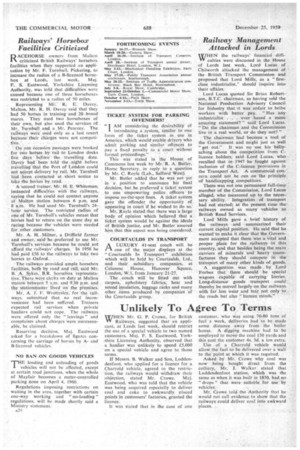Railway Management Attacked in Lords
Page 26

If you've noticed an error in this article please click here to report it so we can fix it.
WHEN the railways' financial diffivv culties were discussed in the House of Lords last week. Lord Lucas of Chilworth attacked the management of ' the British Transport Commission and proposed that Lord Mills, as a " firstclass industrialist," should inquire into their affairs.
Lord Lucas quoted Sir Brian Robertson, B.T.C. chairman, as having told the National Production Advisory Council for Industry that it was unfair to bribe workers with better pay. " Has any industrialist . . ever' heard a more amazing statement?" said Lord Lucas. "'Do the chairman and ihe Commission live-in a real world, or do they not? " The chairman had become a tool of the Government and might just as well "get out." It was no use his bellyaching about the competition from Clicence holders, said. Lord Lucas, who recalled that in 1947 he fought against inclusion of the C-licence provisions in the Transport Act. A cornmereial concern could not be run on the principle of handicapping competitors. There was not one permanent full-time member of the Comnlission, Lord Lucas alleged, who measured up to the necessary ability. Integration cif transport had not started; at the present time the railways owned as many vehicles as British Road Services.
Lord Mills gave a brief history of the railways and sunturearized their current capita! position. He said that he wanted to make it clear that the Government accepted that there was a vital and proper place for the railways -in this country, and that besides being the main carriers of minerals and heavy manufactures they should compete. in the transport of many other kinds of goods. A suggestion was made by Lord Forbes that there should be special wagons capable of carrying lorries. Long-distance goods transport could thereby be moved largely, ort the railways with far less wear and tear not only to the roads but also " human minds."
















































































